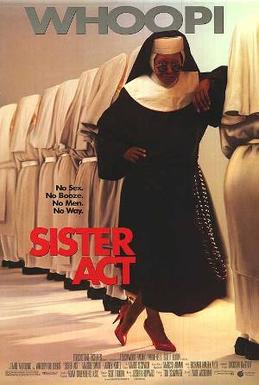Sister Act is a Trite, Didactic Missed Opportunity

May 29, 2019
2/5
There isn’t much directly bad about Sister Act. It’s funny, it has some good performances and it doesn’t bore. But, the entire project feels like something is sorely missing.
For one, the film does not have a fresh plot. The film follows a lounge singer named Deloris Wilson (Whoopi Goldberg) who witnesses her lover, a casino boss, murder someone. The casino boss places a bounty on her head and she goes to the police, who place her undercover in a church as a nun. Now, before I continue with the plot, it’s important to note that all of this happens in an eighth of the runtime, and the main plot of the film hasn’t even begun. Deloris has some trouble fitting in at the church, but slowly she begins revitalizing the church and thrusts it into the communal spotlight. Inevitably, the casino boss finds her, but, Deloris’ newfound friends (her fellow nuns) save her. Perhaps this could’ve been a good film, but, as it happens, it doesn’t provide anything new for the genre. Moreover, it feels extremely preachy, like it’s trying way too hard to push a message to the audience.
The film wants to be a film that teaches you about the value of flexibility in religion. But it’s a narrative that is so overused in cinema (not specifically having to do with religion, but the idea of pushing flexibility in traditionally rigid areas), that the film is a tire to sit through in spite of its solid script and acting.
The likely reason why this is such a trite film, is because its screenplay was doctored by no less than six people after the screenwriter Paul Rudnick wrote it (including Carrie Fisher of Star Wars fame). In fact, upon realizing how much the movie strayed from the original script, Rudnick asked to be credited under the pseudonym Joseph Howard. When there are too many screenwriters on board for a certain project, there is a lot of conflict, and so, the script ends up being very safe, because that’s all the writers can agree on. For instance, there’s a scene in the original screenplay that was cut from the film that had Deloris (whose nun name is Sister Mary Clarence) discuss the topic of teenage promiscuity in a Sunday school, talking about how people should, if in the position, always use protection. Naturally, Mother Superior got mad and chewed her out. In the film, this is replaced by a far more innocuous scene of Deloris explaining to her fellow nuns which (non-existent) convent she comes from. And, it’s easy to see why the former scene was cut. Teenage promiscuity is a controversial topic, and addressing it is never a positive for the box office. But, because of this, the film suffers from a complete lack of conviction towards its message.
Moreover, the film also suffers from the general problem that a lot of didactic films face. They’re preachy. Didactic films aren’t inherently bad. A great majority of them are bad and they give all the others a bad name. Sister Act, like countless other didactic films before and after, conveys its message primarily through expositional dialogue. For a medium whose biggest motto is “show, don’t tell”, expositional dialogue is a lazy way to convey a message. There are countless ways to convey a message without dialogue. For instance, the opening of the film Shame (a movie about a sex addict) has Brandon (the sex addict) staring intently at a woman on a train, while intercutting with Brandon hiring and sleeping with a prostitute (which seems to be the previous night). It sets the stage for the film’s criticism with no direct allusions made to the issue (I know that Shame is a vastly different film from Sister Act, but I bring it up merely because it’s an excellent example of clear, unambiguous, wordless exposition). For comparison, there is a scene in Sister Act which could sum up the message of the film in that conversation. Namely, the scene where Mother Superior scolds Deloris for making the choir entertaining. In fact, Deloris speaks the sentence, “They don’t like coming to church. Why? Because it’s a drag.” Their entire conversation feels like it’s for the benefit of the audience (not that Mother Superior wouldn’t have scolded Deloris, but rather that Deloris justifying her decisions seems targeted at the audience).
However, in spite of all its problems, Sister Act is a fun movie. It’s not hard to see why it was the sixth highest grossing movie of 1992. It has a funny script and some solid actors. There are a couple of cheap, overused laughs, but, there are some genuinely funny moments, especially at the beginning of the movie, when Deloris is acclimating to nun life. The film also effectively uses montage when Deloris is told to clean by Mother Superior, or when the nuns begin to help the neighborhood out. The film shines in its wordless moments of depicting these contrived nuns having moments of freedom out in the world, such as when Sister Mary Patrick dances in the bar for the first time in what we assume to be is just short of forever. And the acting is quite solid. Whoopi Goldberg is a pleasure regardless of what movie she’s in and Maggie Smith simply shines in her moments of quiet outrage when the choir under Deloris sings for the first time and then her change to pride when the girls sing for the pope. And Harvey Keitel, although seeming like he got lost on the way to the set of Mean Streets, does a wonderful job of playing Vince LaRocca (the casino boss).
But, I have a bone to pick with the characters. The characters are unoriginal tropes of movie characters, with very little freshness to any of them. You have Deloris, a liberal who wants reform. Mother Superior, a harsh mistress who ends up warming to the liberal’s ideas. Sister Mary Robert, a closeted individual who turns out to be excellent at something unexpected of her (singing, in this case). Vince LaRocca, the typical tough casino boss. None of the main characters are real characters. Even Sister Mary Patrick, who is one of the riskier characters, is mainly in the film for comedic relief.
Ultimately, Sister Act falls flat in its efforts of providing a message. It never impacts the audience the way it wants to, and it is often a bore. It’s a shame, because, as an atheist, I usually love any film that criticizes religion. But, Sister Act with all of its stiff resistance to any real criticism, never provokes, and, by extension, never holds attention.







Heather Herazo • Jan 19, 2025 at 10:39 am
I am trying to figure out why this person wrote this article in 2019 bashing this movie. It aired in 1992, and was one of the BEST movies made! It’s fun and the plot is just fine, it is a movie about kindness and change, that not everyone is who they even think they are. That we can all change for the better on both spectrum extremes. Bringing together all walks of life. It tells a story that all humans are similar no matter what walk of life they come from, we all want love and acceptance. It is one of my favorite movies. There is a bigger story being told than just the basic plot.